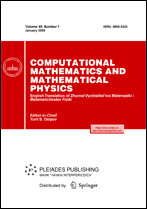|
This article is cited in 5 scientific papers (total in 5 papers)
Efficiency of the estimate refinement method for polyhedral approximation of multidimensional balls
G. K. Kamenev
Dorodnicyn Computing Center, Federal Research Center “Computer Science and Control”, Russian Academy of Sciences, ul. Vavilova 40, Moscow, 119333, Russia
Abstract:
The estimate refinement method for the polyhedral approximation of convex compact bodies is analyzed. When applied to convex bodies with a smooth boundary, this method is known to generate polytopes with an optimal order of growth of the number of vertices and facets depending on the approximation error. In previous studies, for the approximation of a multidimensional ball, the convergence rates of the method were estimated in terms of the number of faces of all dimensions and the cardinality of the facial structure (the norm of the $f$-vector) of the constructed polytope was shown to have an optimal rate of growth. In this paper, the asymptotic convergence rate of the method with respect to faces of all dimensions is compared with the convergence rate of best approximation polytopes. Explicit expressions are obtained for the asymptotic efficiency, including the case of low dimensions. Theoretical estimates are compared with numerical results.
Key words:
convex bodies, multidimensional ball, polyhedral approximation, optimal method, facial structure, convergence rate estimate of algorithms.
Received: 06.06.2015
Revised: 20.07.2015
Citation:
G. K. Kamenev, “Efficiency of the estimate refinement method for polyhedral approximation of multidimensional balls”, Zh. Vychisl. Mat. Mat. Fiz., 56:5 (2016), 756–767; Comput. Math. Math. Phys., 56:5 (2016), 744–755
Linking options:
https://www.mathnet.ru/eng/zvmmf10385 https://www.mathnet.ru/eng/zvmmf/v56/i5/p756
|


| Statistics & downloads: |
| Abstract page: | 260 | | Full-text PDF : | 37 | | References: | 51 | | First page: | 11 |
|





 Contact us:
Contact us: Terms of Use
Terms of Use
 Registration to the website
Registration to the website Logotypes
Logotypes








 Citation in format
Citation in format 
